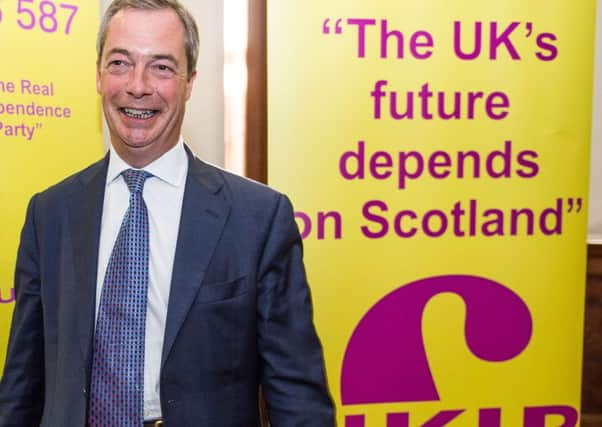Leaders: Gauntlet to party leaders | GSA return


Over the past two months, he has led Ukip through a storm of everything that the major parties could fling at him – serious accusations of racism and intolerance which some of his own candidates have disobligingly fuelled – and has come through to make major gains in the English local elections.
Mr Farage, almost irrespective of what the UK-wide European election results are on Sunday evening, has every reason to be ebulliently cheerful today. His party won no councils, but took a big haul of seats, ratcheting up the equivalent of a 17 per cent share of a UK-wide vote.
Advertisement
Hide AdAdvertisement
Hide AdThis is a very significant achievement by a still-young political party. The Ukip fox, Mr Farage exulted, is now loose in the Westminster henhouse. Indeed, many of its residents, worried about their chances of being re-elected in the 2015 general election, behaved as though they had already lost their heads. True, the ground beneath a lot of them has shaken, but is it a passing tremor or a massive earthquake?
Some Conservative MPs, mostly the noted Eurosceptics, have been quick to call for David Cameron to agree an electoral pact with Mr Farage, fearing that without such an agreement, the centre-right vote would be split and Labour would sweep through.
Labour MPs, however, worried that Ukip has shown its capacity to prevent them from returning to power in 2015 are questioning whether Ed Miliband has his strategy right or even whether he should be replaced. Similar gnawing doubts are being privately raised by Nick Clegg’s Liberal Democrats.
None of them is raising the possibility that the SNP is anxious to pose – that the Ukip success means it is more likely that there will be an in-out referendum on Britain’s EU membership and the result will be out. Thus Scots should vote Yes to independence and staying in the EU.
All this feverish fretting raises the prospect that suddenly all politics is revolving around Mr Farage, that the political landscape is indeed new and unfamiliar, and everything must change.
On an alternative reading, this is a very familiar political story. Well into the life of a government, the governing parties have lost support, the major opposition party has made gains, and a party of protest has made a spectacular impact.
This, however, would be too dismissive. The one thing the three major parties agreed on was that the electorate is discontented, distrustful of the political establishment and is demanding change. Standard political patterns have been disrupted, and the capacity for further damage has been demonstrated.
Exactly what changes should be made, however, should await a fuller analysis of the results, including those of the European elections. Political leaders need to hold their nerve and come up with considered answers to the challenges voters have laid down.
The ‘Mack’ must rise from the ashes
Advertisement
Hide AdAdvertisement
Hide AdThankfully, no-one seems to have been killed or injured, but the fire which tore the heart out of Glasgow School of Art is still a disaster. It is a disaster for the students, the staff, the city, Scotland, and for the architectural heritage of Britain.
For students, producing work for the final degrees this year, indeed at any stage of their studies, and the staff working with them, the destruction is utterly heart-breaking. Equally soul-destroying is the loss of archives and records.
More heart-rending still is that Charles Rennie Mackintosh’s finest design is not just a world-renowned work of art in its own right, but has magnificently done its job for more than a century as a constant source of inspiration to those who studied there.
The list of its graduates who have been nominated for, and won, the Turner prize for contemporary art testifies more eloquently to that than any recounting of the architectural prizes and praises that it still wins. Without it, Scotland’s contribution to artistic achievement would have been infinitely smaller.
But this dreadful fire should not be regarded as an end to that. Many of Europe’s cities boast inspiring buildings which appear to be ancient, but which are actually reconstructions of what was there before war razed it flat. The “Mack”, too, can be rebuilt.
Glasgow will rise to the challenge, as it has done in staging the Commonwealth Games, and in producing many other culturally important buildings such as the Royal Concert Hall. Scotland and the Scottish government should too. Out of yesterday’s ashes of despair should come today’s determination to rebuild a place where tomorrow’s dreams and dreamers can be created.